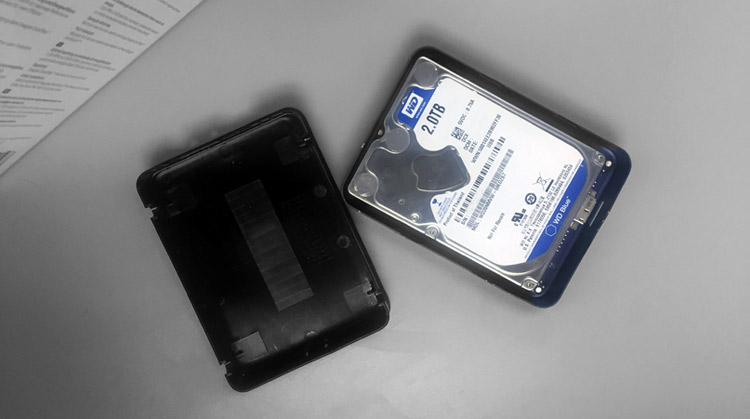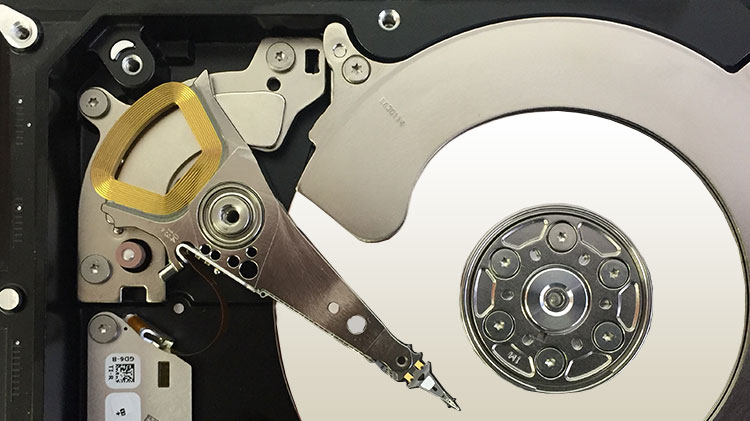
A dropped hard drive is never a good thing. That is, of course, unless you dropped it on purpose for whatever reason.
Before I get to the details on what you should do when this happens, I’d like to spend some time explaining what can happen to a hard drive when it is dropped.
I’ll admit that a hard drive looks pretty solid, however, the components inside of one are not so solid. Well, at least some of them.
When a hard drive is dropped, a few things can happen to it. There are times when dropping a hard drive will appear to have caused no damage but it really depends on how hard the drop was and from what height.
In most cases, a hard drive will start to make clicking sounds after being dropped.
This tells you that there has been damage to the HSA/GHA – which happens to be the most fragile part of the hard drive.
This leads me to my first step on what you should do…
1. If data recovery is not required
Open the RMA at the manufacturer’s website and order a replacement drive (if it is still under warranty). There are instances where drives will still be replaced even after the warranty has expired. All you need to do in this case is to make contact with the manufacturer’s customer service department. You may luck out.
Checking the drive to see if it is clicking will not have any impact on this step. Even if it doesn’t happen to click. That’s because a dropped drive is not a safe hard drive, period.
You should get a replacement.
2. If the data requires recovery
(a.) – If you dropped the hard drive but have not turned it on after it was dropped
If you wish to save some or all of the data from the dropped drive and you don’t know if it is clicking or not, but you want to know for sure…
What you shouldn’t do
Ideally, you want to avoid the ‘curiosity killed the cat’ situation. The drop may have caused the Head Stack Assembly to become stuck over the platters.

There is also a chance that contact has been made with the platters inside. If you start up the hard drive, your chances are good that the platters will rotate but you risk damaging them with the GHA. The result will be scratches in a circular, round manner that will render recovery chances from very high to very low. This is a risk you will probably not want to take.
What you should do
Take your dropped hard drive to a reputable data recovery firm. This means you have to do some research first by not selecting the first link that appears on a Google search. The data recovery industry is actually somewhat sketchy so a SERP with many positive reviews doesn’t always equate to quality recovery. It is actually quite easy to get scammed in this industry.
To find out what to look for in a good data recovery firm, check out this article here.
(b.) – If you dropped the hard drive and turned it on and now hear clicking and beeping sounds
What you shouldn’t do
Don’t try to open it up to determine what is making the noises. Seriously, the drive was dropped and it has damage. Without the proper tools and expertise on hard drive repairs, you won’t be able to do very much in this case. The moment you pop open the casing and remove the seals, you have suddenly increased the cost of recovery by at least 50% at pretty much every other data recovery firm. A broken seal may cost you twice as much as it should.
What you should do
Do exactly as I have explained above. Go to a professional once you have conducted a fair amount of research. Once you find one that sounds good, phone, ask questions and then make your decision.
Some of the questions you should ask:
- What are the maximum and minimum prices for mechanical data recovery? Ask what the average price is for recovering data from a dropped external hard drive that is clicking.
- Ask if an appropriate donor drive exists at their facility. Here’s an article to show you precisely what donor drive will be required for your machine.
- Ask if diagnostics are free of charge and if you can wait on site as the diagnostics are being conducted, should you decide to visit a local data recovery firm.
- Ask to visit the clean room facility.
- Ask if the firm stands by the “No Data, No Charge” policy.
If you get the feeling during any of this conversation that you are getting brushed off, just take your business elsewhere.
The bottom line is that you will have to be prepared to invest in this type of recovery. It will not be $50 or $200. On average, cases that involve clicking drives after being dropped can range anywhere from $600-$1200 depending on the availability of donor drives and other factors.
Opened seals on hard drives will be priced even higher, so you will want to keep them intact.
Scratched platters can cost from $1500 and beyond at any data recovery firm in the industry. To find out more about scratched platters and the likelihood of recovery, please read this article here.
Finally, if you have a hard drive that has been dropped, and require assistance, please open a recovery case OR send us a message via our contact form.
